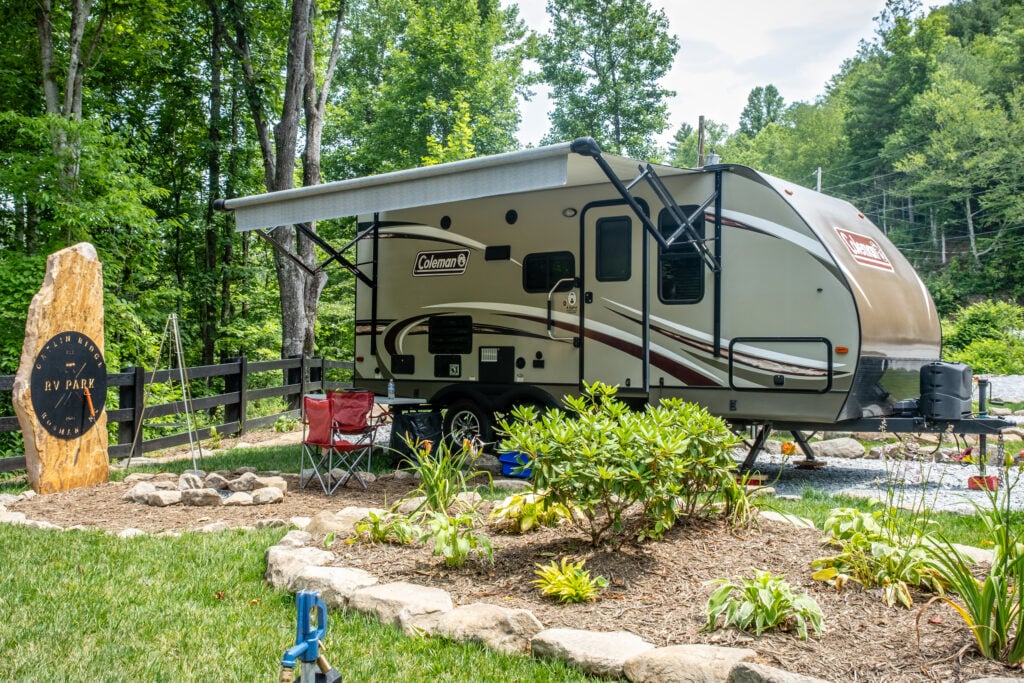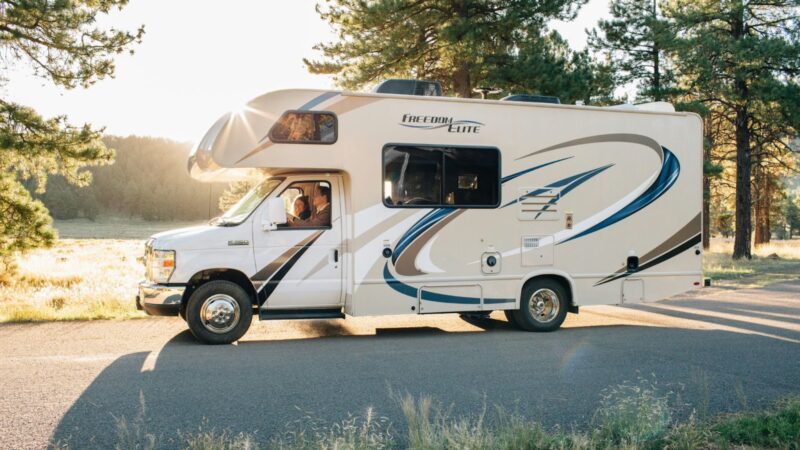How Much We Really Spend RVing Full-Time Each Month

Is Full-Time RVing More Affordable Than You Think?
“Can we afford to RV full-time?”
Anyone considering RVing full-time will invariably ask this important question. It’s usually among the first considerations for new RVers.
The primary concern isn’t necessarily about knowing one’s income. Most individuals are aware of the money they can access monthly as full-time RVers. The real uncertainty is about the costs of the new adventure. This is where many potential full-timers fall short, often severely underestimating the costs of full-time RVing.
How much does full time RV really cost?
Naturally, people might underestimate RVing costs. After all, transitioning to full-time RVing means eliminating costs such as house payments, property taxes, homeowner’s insurance, HOA dues, and gym memberships. Many believe that after selling their house, they can clear debts. So, what expenses could remain?
Though full-time RVing entails higher fuel and camping fees, most expenses like food, car insurance, medical supplies, and pet food remain constant. Some then assume the additional costs of RVing couldn’t possibly surpass household and HOA payments. This assumption often leads to a harsh reality check.
Example
Consider this example: We met a couple who sold their home and business to travel in a motorhome. Despite planning to sustain their lifestyle from the proceeds of the business sale and savings, they soon found that full-time RVing was pricier than anticipated. A few months in, they had to resort to daily labor jobs for sustenance. Ultimately, they returned to their former business as employees.
Stranded due to a lack of funds
Another couple’s experience was more heart-wrenching. While traveling, their Airstream trailer broke down in a small Washington town. Lacking funds for repairs, their financial situation spiraled. They sold their tow vehicle and became camp hosts at the local fairgrounds, relying on a modest job for basic necessities. This situation left them stranded, with a damaged trailer and limited prospects.
A great budgeting strategy
When we first ventured into full-time RVing in 2017, we met Nikki and Richard, seasoned RVers since 2014. Like many, we wondered about the affordability of this lifestyle. While we had a budget, we were unsure of its accuracy. Stories of others running into financial hardships lingered in our minds. Nikki and Richard shared their experiences and budgeting strategy with us.
Sticking to a $100 daily budget
Nikki mentioned that they tried to limit their daily expenses to $100, encompassing everything from food to healthcare. Calculated monthly, this amounted to about $3,000. The daily limit helped them stay on track, making adjustments when necessary.
Being new to the lifestyle, we initially thought $3,000 monthly seemed excessive. However, five years down the line, managing to spend just $3,000 in a month feels like a significant achievement.
Some manage on less than $1,000 a month
Every RVer’s experience is unique. We’ve come across individuals who consistently spend less than $1,000 monthly. Adapting to a budget, some full time RVers cut down on travel, while others opt for dispersed camping to minimize costs. There’s no one-size-fits-all approach.
Making choices on discretionary spending
Areas where RVers have control over spending include camping fees and dining. Campground fees can range from free to $200 per night. Many places offer discounted weekly or monthly rates.
Opting for free parking while in transit
Some RVers find solace in parking lots like Walmart or Cabela’s when traveling. In certain regions, RVers can also halt for the night in rest areas or truck stops. While these options lack amenities and can be noisy, they’re free and can offset costs.
Embracing dispersed camping
Dispersed camping, or boondocking, is free camping on public lands. While not everyone’s cup of tea, it can significantly reduce expenses. Some RVers frequently boondock for weeks at a time, incurring zero camp fees.
Considering campground memberships
While some might find parking in lots, gas stations, rest stops, or even boondocking in secluded areas unnerving, others thrive in these environments. Remember, everyone’s comfort level varies. If you prefer fully-equipped campsites with comprehensive amenities, then exploring campground memberships might help cut down on camping expenses.
With numerous options available, RVers should research to find a membership that matches their preferences and budget. While there’s an upfront enrollment cost and annual dues, the potential savings can be considerable. Some great options include Thousand Trails, Escapees, Harvest Hosts, and Boondockers Welcome.
Becoming a camp host
Another way to minimize campground fees is by taking on the role of a camp host. This involves staying at the campground for free in return for assisting with its operations.
Monitoring other discretionary expenditures
While campground fees might take up a significant chunk of your budget, other discretionary expenses can also impact your financials. For instance, dining out during travel days can quickly add up. Those occasional $70 dinners can increase your monthly expenses substantially. If you aim to spend just $100 per day, splurging on a single dinner leaves minimal room for other outlays.
Personal choices affecting the budget
Several expenses play into the RVing budget including gas, insurance, maintenance, food, pet care, medical insurance, and technology, among others. Personal preferences can greatly influence these costs. For example, our consistent high expenses stem from pet care and quality dog food. We made a conscious decision to prioritize our pets’ needs over other non-essential expenses like alcohol or soda. It’s crucial for RVers to tailor their budgets based on their values and resources.
How much we spend (on average)
For a clearer picture of our own spending, our average full-time RV expenses amount to about $4,500 a month, surpassing our $3,000 target. In fact, since 2017, we’ve consistently missed this mark.
Furthermore, we’ve been fortunate to not have any RV or car payments, freeing up a portion of our budget. Some of our significant expenses have included:
- Over $8,000 on pet care
- Around $4,000 on technology (internet access, gadgets, etc.)
- Our grocery bills were even lesser than our pet food expenses
Key budget categories to consider
If you’re planning your own full-time RV budget, it’s crucial to account for a range of categories:
- Food and groceries
- Medical bills
- Campsite charges
- Dining out
- Child-related expenses
- Recreation and entertainment
- Pet care
- Household supplies
- Vehicle-related costs (maintenance, payments, etc.)
- RV-specific costs and payments
Establishing a savings account for significant repairs
It’s wise to allocate funds for substantial maintenance tasks like battery replacements, brake repairs, and tire changes. For instance, we spent $2,000 on a brake job for our previous RV, and six new tires set us back over $3,000. Setting up a dedicated savings account for such costs can prove invaluable in the long run.
RV expenses add up
Every expenditure counts when you’re RVing full-time. Staying mindful of costs, whether it’s a dinner outing, a vet appointment, or a monthly internet bill, is essential to maintain your budget.
Recognizing your financial boundaries
Determining if you can afford full-time RVing boils down to your financial discipline and dedication. Those with vast resources might not need to ponder these details, but for many with limited incomes, budget management is vital. Reflecting on Nikki and Richard’s discipline with their $100 daily limit often makes us wonder about our own financial choices.
Get tips from other RVers
One of the best parts about RVing is engaging with the community of traveling enthusiasts. iRV2 forums allow folks to chat with other RVers online, and get other perspectives on everything RVing, including products, destinations, RV mods, and more.
The post How Much We Really Spend RVing Full-Time Each Month appeared first on RV LIFE.






